The Bear Gen 6 Trucks are one the best longboard trucks available in today’s market. Check out my review to find out what makes them so good and what’s bad about them too.
Specs
- Baseplate angles: 50°, 40°, 30° (compatible with other Bear RKP baseplates)
- Width: 130mm, 155mm, 180mm
- Construction: Cast Aluminium
- Rake: 4mm
- Cost: $60
Bear Gen 6 trucks review
Summary – These could be the best all-around cast trucks in the game
I have done some of my best skateboarding on these trucks. They’ve been there for me whether I’ve wanted to cruise, do LDP, dance, or go fast. They can do it all.
They also have what is arguably the best feel in the industry. They’re super leany, carvy, and have a playful, surfy ride. They are such a fun skate.
For comparison’s sake, they feel like Paris that just lean a bit more and are less aggressive with their turn. Whilst the Caliber IIIs feel more darty and aggressive with their turning. These turn slightly slower but are more surfy.
I can’t stress how nice they feel.
And with all the options for sizes and baseplates you get, you’re accommodated
no matter what your requirements are.
With the plug-barrel bushings, these trucks have little to no slop and are suited well for skating fast and pushing your limits. The plug-barrel bushings allow them to skate almost as well as precision trucks – and yes you can use the Venom HPF plug bushings on them.
However, the Venom plugs aren’t a perfect fit and you have to sand the plug a bit to allow them to sit flush (the Venom plugs are designed around Cal IIIs which have a thicker bushing seat). It’s slightly annoying, but not a deal-breaker.
The plug-barrel bushing allows the truck to provide a stable, smooth, and well-supported feel through the lean and turn. What results is a confidence-inspiring ride.
And the stock components are good. But you may want to upgrade to after-market parts if you want a different feel. But this won’t be an issue for most, especially if you’re using them for just cruising. They work great out of the box.
Altogether, the Bear Gen 6 are one of the best cast trucks available right now. They’re appropriate for all sorts of riding and will work well for a variety of riders.
Upgrades from the Gen 5 Bears
The Gen 6 Bears feature a wider bushing seat that is compatible with 1inch wide bushings (basically the standard size of all RKP bushings today).
The Gen 5 Bears had a smaller bushing seat. They worked with some specific bushings Bear used to make. This bushing was smaller than 1inch.
To fit other aftermarket bushings in them, you had to sand the bushing seat facing side down on the sides a little bit. It was a little annoying to deal with admittedly, but ultimately not too big of a deal.
The Gen 5 also had a restrictive bushing seat, and the turning felt more aggressive. Not a lot of people liked the feel of them.
The Gen 6 Bears have a more open bushings seat, and they use a plug barrel bushing. They have a flowy and carvy turn.
The Gen 6 are a great upgrade.
How do they Gen 6 turn?
The Gen 6 have a very leany, carvy turn.
They turn a lot before the plug-barrel bushing provides a bunch of resistance to restrict the turn at the end of the lean.
They feel leanier and turnier than Paris, but don’t turn as aggressively as Caliber III Rs.
The Gen 6 have a similar bushing seat to the Paris V3, but it is more open. They feel like Paris V3s that just lean and turn a bit more.
On the Paris V3, the bushing seat gets more restrictive towards the edges – this is what provides resistance and an end to the lean and turn of the hanger.
With the very open bushing seat of the Gen 6, the truck feels like it could lean forever. It’s only towards that edge that you start to really dig into the plug-barrel. It provides resistance and gives a progressive end to the lean.
So the plug barrel is needed to make these trucks work. Without it, the truck just wants to lean and turn forever. You don’t get an “end-to-the-lean”. I believe you need the plug-barrel to make the most out of this truck, but more on this later on.
What results, is a truck that feels very flowy, leany, and carvy. It feels very playful underfoot and has a very surfy feel.
I think these are the best feeling trucks out there, especially for carving and getting your vibe on.
They have a direct feel
Thanks to the plug-barrel bushing and reduced slop, these trucks have a direct feel to the lean, turn, and your input.
It feels like the trucks match your exact input. They only do what you tell them to.
And even if you turn aggressively, they will still be under control.
Are the bear gen 6 trucks stable?
Yes. Despite being playful underfoot, these trucks are quite stable.
They have a strong center, meaning they won’t turn left or right unless you engage them and make a deliberate input.
They are well supported throughout the lean and turn by the plug-barrel. You get a smooth lean, and it’s quite easy to hold the trucks at an angle.
They also have good return to center. When you go over a road imperfection, the truck reacts to it before coming back to the neutral position on its own. They do well over rougher roads and going over road imperfections at speed.
And though the center is strong, it didn’t feel as strong as it did on the Calibers with the same bushings.
Do they lean good?
They have a lot of lean for a truck with short bushings – thanks to that open bushing seat.
But this lean is smooth, controlled, and feels consistent.
You also get a lot of support from the plug-barrel and can get edge-to-edge quickly but smoothly.
Are they lightweight
Actually yeah, they’re not super beefy and you can tell they aren’t heavy.
This is odd, I haven’t noticed that big of a difference in the weight of a truck before.
But it really counts for very little in practical terms.
Is the 40* plate too low?
The 40* plate is to be used for downhill and freeride skating and for hitting higher speeds.
It’s an odd choice by Bear. Most companies have angles from 43-46* for their downhill trucks. For this reason, 40* might be considered too low of an angle by some.
When cruising around, using the 40* plate results in a ride that feels sluggish and it’s hard to make tight turns. But this is only an issue at slow speeds.
Going faster, the 40* plate feels just as lively and turny as 43*, or 44* plate would.
It’s very appropriate for downhill and freeride.
Are the 130mm Gen 6 good narrow truck options?
Yes, they work great. But they’re simply not as good as precision trucks designed to work well in that narrow width.
If I hadn’t tasted narrow precisions, I would have probably been quite satisfied with the narrow Bears.
They actually turn good, feel well supported through the lean, and are quite stable.
But they simply aren’t as turny (as eg. Smokies, Aera P2s), and aren’t as stable and as direct in the feel.
If I was pushing my limits and wanted to compete at the highest level, they just won’t cut it. I would feel held back.
They just don’t stand on level ground with precisions.
They felt similar to my 140mm Savants in the sense that they worked well, but they weren’t and truly suited to the task.
If you just want narrower trucks for downhill, the 130mm work well. They’re a good option if you’re on a budget.
But if you do plan on competing and pushing your limits, plan to or simply upgrade to precision trucks designed for that narrow width. The difference in stability, directness of feel, and turn is considerable and is worth the investment.
The 130mm are amazing for cruising
If you simply want narrow trucks for cruising, the 130mm with the stock bushings feel amazing. They work great. I’ve loved them on my Landyachtz Ripper.
Are the stock components good?
Are the stock bushings ok?
The quality of the bushings is actually quite good. You get different hardness bushing depending on the width of your truck and the angle you get.
For example, with the 130mm, you get 83a bushings. For the 180mm, you typically get 90a bushinga.
However, they’re not comparable to the Venom HPF bushings found stock in the Caliber III tho. But they are just as good as the stock Divine bushings found in Paris trucks.
They also have a bit of rebound and feel quite stiff for their 90a duro (when compared to the 90a Venom HPF bushings).
This rebound is nice for cruising and carving. It just gives you a tiny bit more bounce in and out of turns. But they do provide a stable ride still.
The harder-than-average feel is nice too. Gives you a lot of stability and support in the lean and turn.
As always, if you’re a much heavier than average, or lighter rider, you might prefer a harder or softer bushing respectively, to give you more stability and support, or an easier-to-turn truck.
How about the pivot cups?
I haven’t felt the need to upgrade the pivot cups in my Bears. I’m enjoying the stock versions.
However, I certainly will once they wear down, but that won’t happen soon. After months of riding, they’re still holding up well.
They do sometimes squeak, but dropping some soap shavings in there fixes that easily.
Are they good for dancing?
Yeah, probably. I don’t dance much, but these trucks are smooth and controlled and have a nice feel.
I think they will do well for dancing.
Are the Bear Gen 6 trucks good for cruising?
Yes, they’re great for cruising. I think they’re the best trucks for it. I like how they feel.
How the plug-barrels work
The plug-barrels work as a slop stopping system. They prevent the hanger from moving in any undesirable way.
They also support you in the lean and help give a direct feel to the ride.
They also provide a lot of resistance as you begin to max out the lean of the truck. This helps give the truck an “end-to-the-lean”, which is needed by most riders for sliding.
Without the plug barrel, the Bear Gen 6 feel like they lean endlessly.
Tip: you can also use a plug-barrel as the roadside bushing – with the plug entering the kingpin hole upside down. This gives a less aggressive return to center. It also opens up what sort of bushing you can use boardside (think Riptide canon, Venom Freeride, etc.).
What if you don’t use a plug-barrel?
The plug-barrel is NEEDED to make these trucks feel good.
The only other non-plug bushing I’ve found that works well is Hardcore Barrel bushings. But they’re a little bit different from your average bushing.
But yeah, without the plug-barrel bushing, you’ll need much harder bushings to compensate for all the insane lean you’ll get. You also won’t get an end to the lean and you will suffer a lot of slop. These trucks just don’t feel the best without em.
So yeah, plug-barrels bushings are the way to go in these trucks.
One issue with the Venom Plug-barrels …
The plug part of the after-market Venom HPF plug-barrel is too tall for the Bear bushing seat.
The bushing seat thickness of the Gen 6 hanger is too thin and a bit of the Venom HPF plug sticks out. This raises the other bushing and makes the truck not work as intended.
You have to crank the kingpin nut down to get good performance. Otherwise, you get a bit of a dead feeling center with no rebound until you engage the truck. This gives you inconsistent performance.
But yeah. The plug-barrel is designed around the Caliber III trucks. They have a thicker bushing seat and the plugs fit perfectly in them.
It’s a bit annoying to have to deal with this in the Gen 6, but once you sort it, you kinda forget about it.
How to fix this
To fix you have to sand the tip of the plug barrel a bit to get the best fit – this is easily done on your griptape.
Sand until the tip is flush with the hanger – compare how flush the stock Bear bushing is, aim for a similar fit.
**Thanks to a Redditor from r/longboarding for pointing this out!
I didn’t like the plug roadside
You can run the plug-barrel roadside in these trucks, but I didn’t like how it felt sometimes.
Sometimes the return to center wasn’t consistent and it just felt a bit weird, sometimes it wasn’t.
I talked to Dexter about this (or rather he hit me up to include it), and he said, “once the truck is weighted up, the hanger compresses towards the board, so when it’s on the boardside it snugs up the insert but on the roadside it pulls out kinda”.
And I agree with him.
The trucks didn’t perform the best this way … and I mean I made it work and I could skate them well, I just didn’t enjoy how they felt.
But also this was inconsistent. When I tried it with some setups and run the plug roadside (mostly on symm setups), I didn’t get this issue … so your mileage may vary. Do keep it in mind though.
Plug barrel is the future
I reckon most cast trucks in the future are going to have plug-barrel bushings. It’s such an easy and reliable way to prevent slop! It just makes sense.
Caliber III Vs Bear Gen 6
Calibers come with better stock parts then the Gen 6. The Venom HPF bushings and the urethane pivot are hard to beat. They also ride lower.
The Gen 6 also loses on the fact that you have to sand down the after-market Venom plugs a bit to get them to fit flush and work right.
Out of the box, the Caliber III are outrightly better. And paired with the option to run tall bushings? Damn.
The Gen 6 are great, but Caliber just went above and beyond with their truck offering.
But ultimately, it all boils down to feel, performance, and if the truck is suited to the riding you want to do.
Gen 6 have a better feel in my opinion and have more truck options. They suit my tastes better, and the selection of trucks has fitted my requirements better (130mm narrows are the shiznit).
But it’s all personal. It depends on what you’re looking for.
Check out my Caliber III review to find out more about these trucks.
Paris vs Bear Gen 6
Bear Gen 6 are overall better than the Paris V3 in my opinion.
With the plug-barrel bushings, they perform better. You can feel this when riding at the limits, skating fast, and skating over road imperfections.
However, for just cruising, it depends on what feel you want. Both work great.
If you want a slightly more aggressive turning truck, the Paris works great.
If you want a truck that is more carvy and surfy, the Bears are your go-to.
Both come with decent stock parts, but not are as good as Calibers.
Both have similar ride heights.
What I didn’t like about the Gen 6 Bears
I didn’t like that you have to sand the Venom plugs a bit to get them to work best. In the long run, not an issue that is a deal-breaker.
The plug barrel selection from Venom is wanting. WIth the open bushing seat, you need to run bushings slightly harder than normal. This is ok for lighter riders, but heavy riders aren’t accommodated. You don’t get super hard plug barrels.
That said, unless you’re running a split-angle set up with a low-angle rear and need damn hard bushings, you will be ok. I do think a 97a boardside, and a 95a plug roadside should work for most really heavy riders. But a 97a plug barrel would be a nice addition.
I also didn’t like that they haven’t yet released the 30* baseplate. But, I hypothesis that is dropping in the upcoming March release. Don’t take my word for it though. But, I’m hoping for it.
My Bear Gen 6 setups
Below are different ways I set up my Bear Gen 6 trucks. They’re appropriate for different styles of riding and different feels.
You can draw some inspiration for your setup from them.
Whilst they’re good for a specific type of riding, none are explicitly beginner-friendly or better for pros. Very subjective stuff. But some are better for beginners than others.
I also weigh 78kg/171lbs.
Setup 1
- Deck: Landyachtz Freedive
- WB: 23.5inches
- Griptape: 60 grit Lokton
- Trucks: Bear gen 6
- Width: 155mm
- Baseplate Angles: 40/40
- Bushings: 93a/93a plug barrel Venom HPF
- Washers: Cupped washers all around
- Wheels: Yates Hawgs, EZ Hawgs, Tracers Dragonskins, etc.
Setup 2
- Deck: Landyachtz Freedive
- WB: 23.5inches
- Griptape: 60 grit Lokton
- Trucks: Bear gen 6
- Width: 155mm
- Baseplate Angles:
- Front: 50°
- Back: 35°
- Bushings
- Front: 85/85a plug barrel Venom HPF
- Back: 93/95a plug barrel Venom HPF
- Washers
- Front: Flat small washer RS/Flat washer BS
- Back: Cupped washer RS/BS
- Wheels: Remember hoots, Green Krimes, Supreme Hawgs, etc.
Setup 3
- Deck: Landyachtz Freedive Reef
- WB: 23.5inches
- Griptape: 60 grit Lokton
- Trucks: Bear gen 6
- Width: 130mm
- Baseplate Angles:
- Front: 50°
- Back: 30°
- Bushings
- Front: 81/85a plug barrel Venom HPF
- Back: 95/95a plug barrel Venom HPF
- Washers
- Front: Flat small washer RS/Flat washer BS
- Back: Cupped washer RS/BS
- Wheels: Blue Biggie Hawgs.
Setup 4
- Deck: Landyachtz Drop Cat
- Trucks: Bear gen 6
- Width: 180mm
- Baseplate Angles:
- Front: 50°
- Back: 50°
- Bushings
- Front: 87/87a Hardcore Barrel
- Back: 93/93a Hardcore Barrel
- Washers
- Front: Flat washer RS/BS
- Back: Cupped washer RS/ Flat washer BS
- Wheels: Plow Kings.
Setup 5
- Deck: Landyachtz Drop Hammer
- Trucks: Bear gen 6
- Width: 180mm
- Baseplate Angles:
- Front: 50°
- Back: 50°
- Bushings
- Front: 90a Cone/Barrel Bear bushings
- Back: 90a Cone/Barrel Bear bushings
- Washers
- Front: Cupped washer RS/BS
- Back: Cupped washer RS/BS
- Wheels: Kegels
Setup 6
- Deck: Landyachtz Ripper
- Trucks: Bear gen 6
- Width: 130mm
- Baseplate Angles:
- Front: 50°
- Back: 40°
- Bushings
- Front: 90a Barrel/Barrel Bear bushings
- Back: 85a Barrel/Barrel Bear bushings
- Washers
- Front: Cupped washer RS/BS
- Back: Cupped washer RS/BS
- Wheels: Lean Cheetah Hawgs
Setup 7
- Deck: Rocket Micro
- Wheelbase: 22.5inch
- Trucks: Bear gen 6
- Width: 130mm
- Baseplate Angles:
- Front: 45° (Smokies baseplates)
- Back: 20° (Smokies baseplates)
- Bushings
- Front: 85/85a Barrel Venom HPF bushings (85a plug-barrel)
- Back: 95/97a Barrel Venom HPF bushings (95a plug-barrel)
- Washers
- Front: Small flat washer RS/Flat washer BS
- Back: Cupped washer RS/Flat washer BS
- Wheels: Flipped Magnums
Setup 8
- Deck: Prism Trotta Pro
- Wheelbase: 25inch
- Trucks: Bear gen 6
- Width: 180mm
- Baseplate Angles:
- Front: 40°
- Back: 40°
- Bushings
- Front: 93a/95a Barrel Venom HPF bushings (93a plug-barrel)
- Back: 93a/95a Barrel Venom HPF bushings (93a plug-barrel)
- Washers
- Front: Cupped washer RS/BS
- Back: Cupped washer RS/BS
- Wheels: Powell Dragonskins
Did you enjoy this review of the Bear Gen 6 trucks?
Let me know what you guys think about the review! It could have been more in-depth and have more info, but I didn’t think a lot of it added much more to the review. This is shorter, but I think it is well representative of the trucks.
Big thanks to all my patrons for the support – David, Squirrels Adventures, Mike, Jed, Mowgii, Jan, Josh, Jay, Jay, Bryan, @owencampbell777, @dkwan, Alex, Kasajja, Domnik, @pablo.vega.andrade, Vlad, Asa, Helge, DeLacoste, Peder, Josh, Mike, Anthony, @issishreds, Greg, Jackson, Slipa, Louisa, Bill, Steve, Brain, John, Austin, @bomber_p_, Brian, Jeffrey, Jules, Henry, Austin, Philip, Oliver, and Justin. I couldn’t write articles like this without you guys’ support.
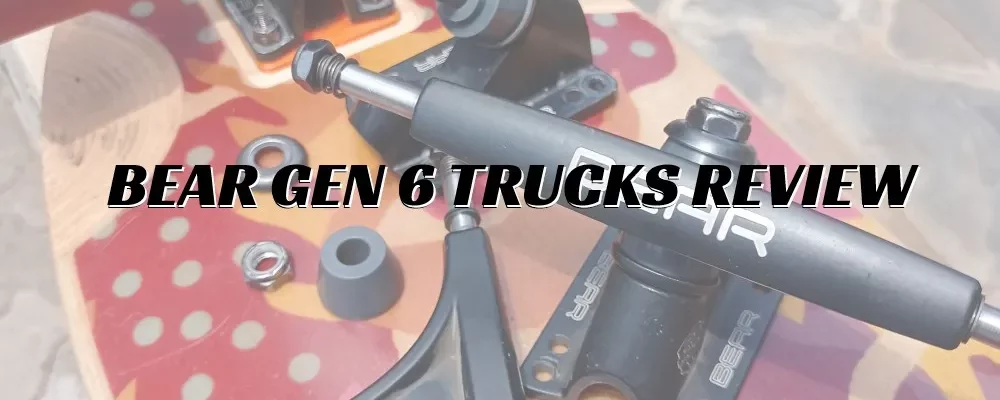
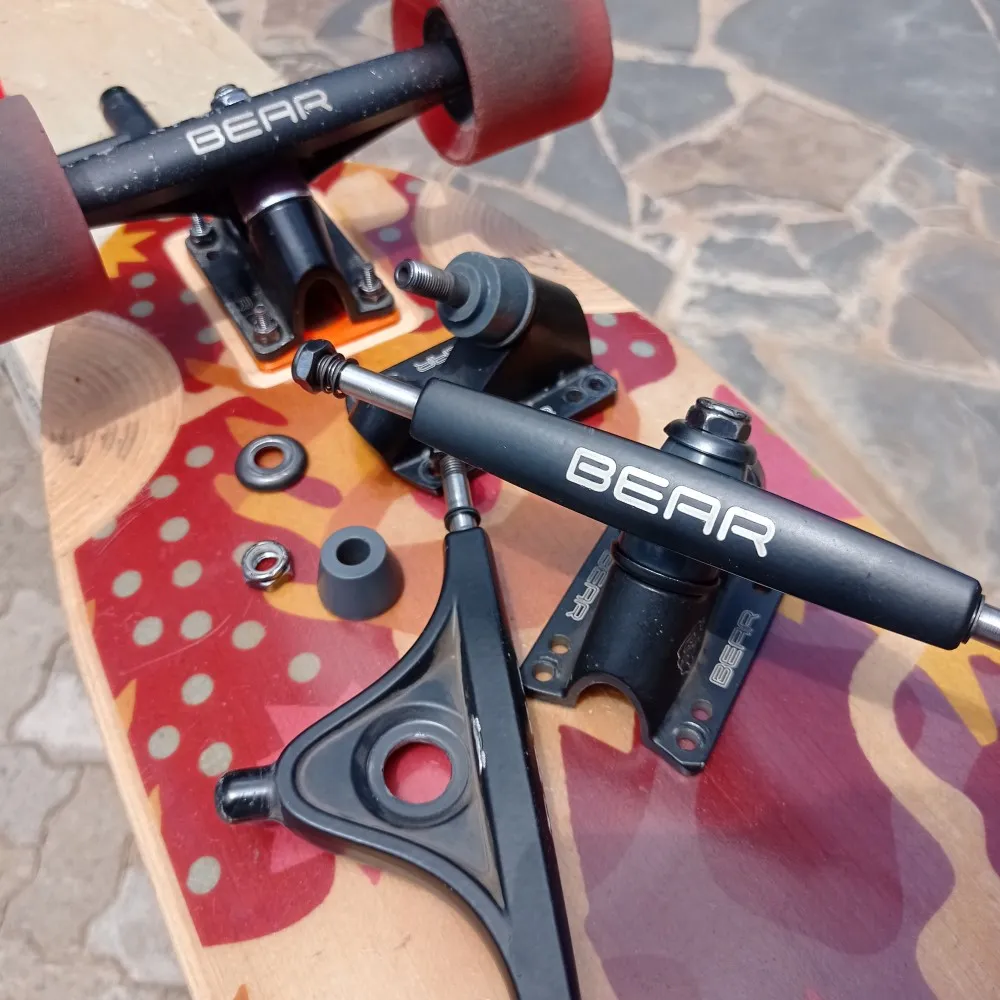
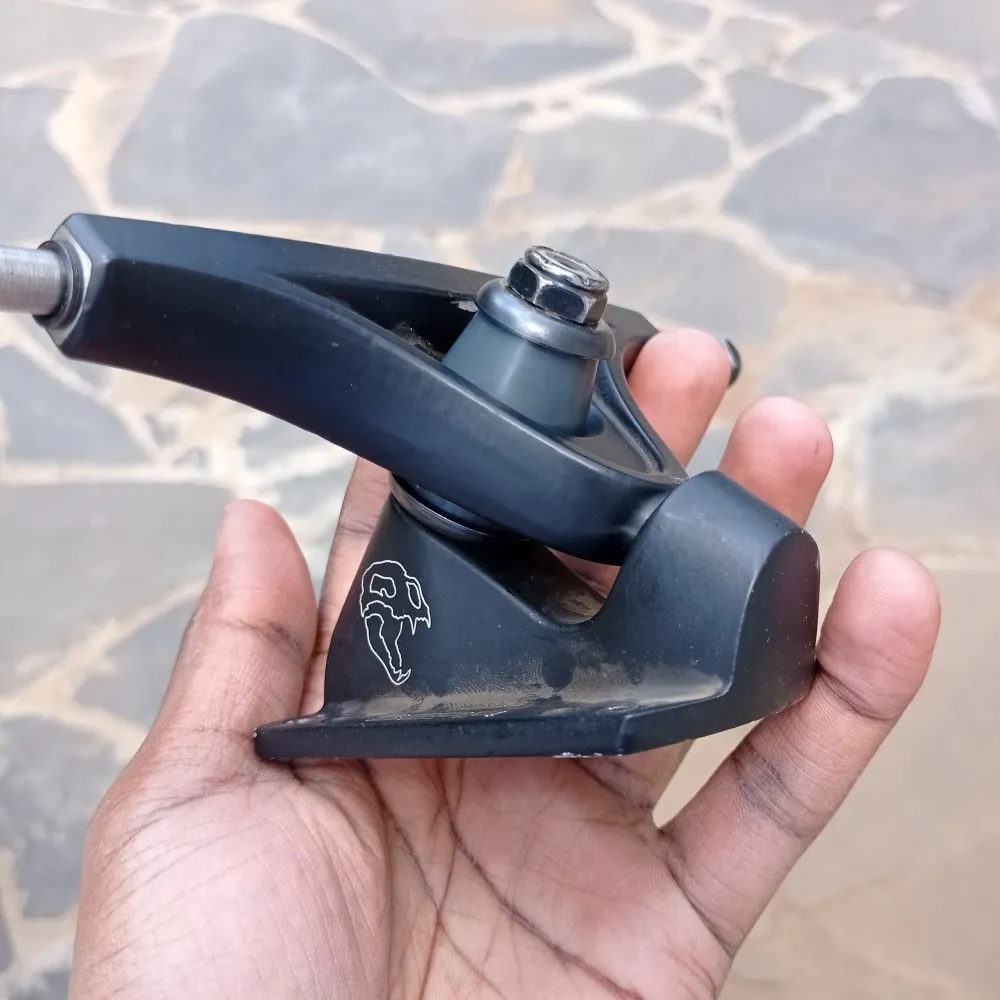
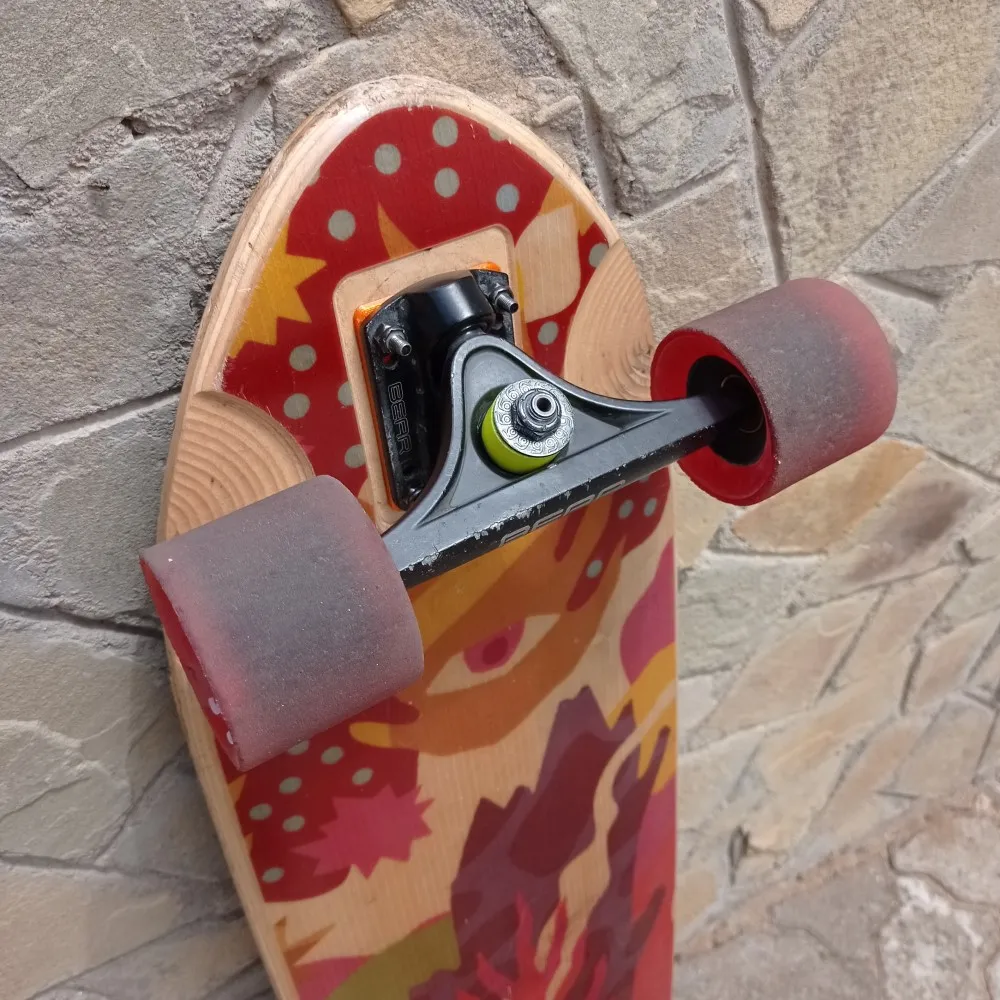
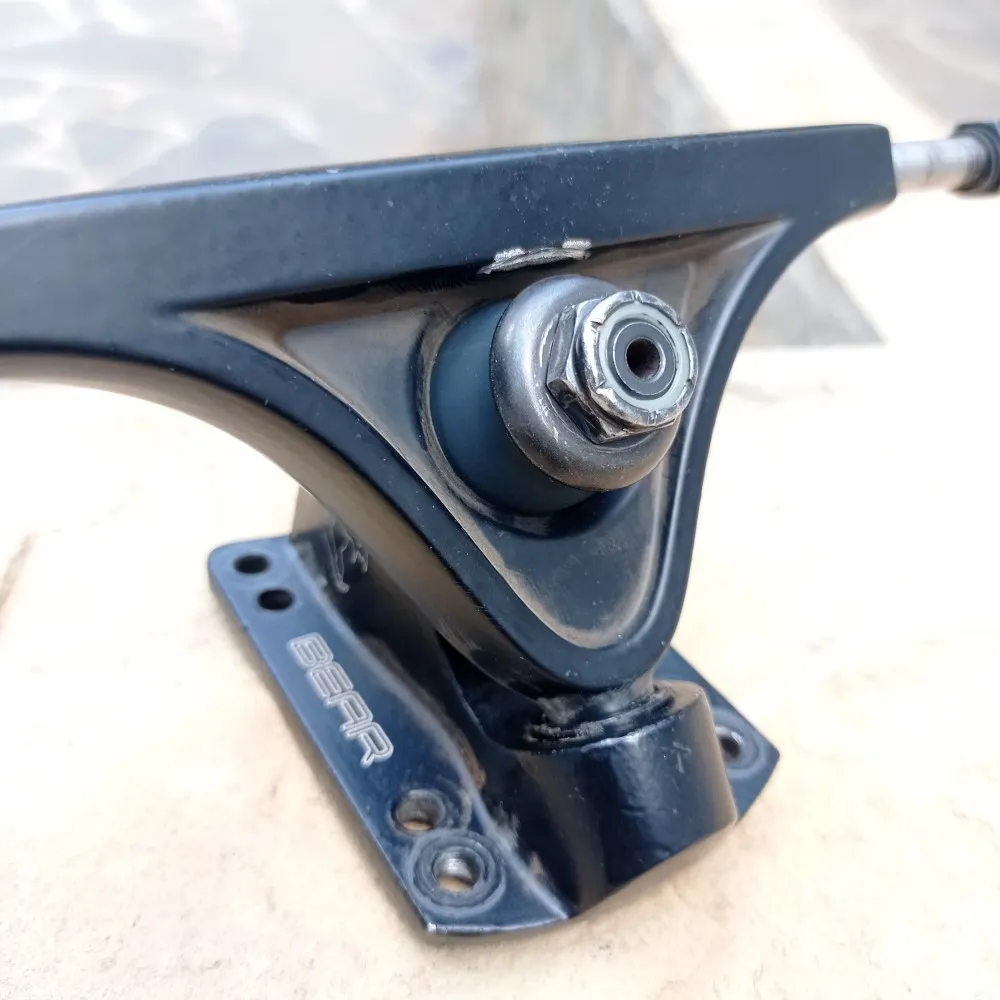
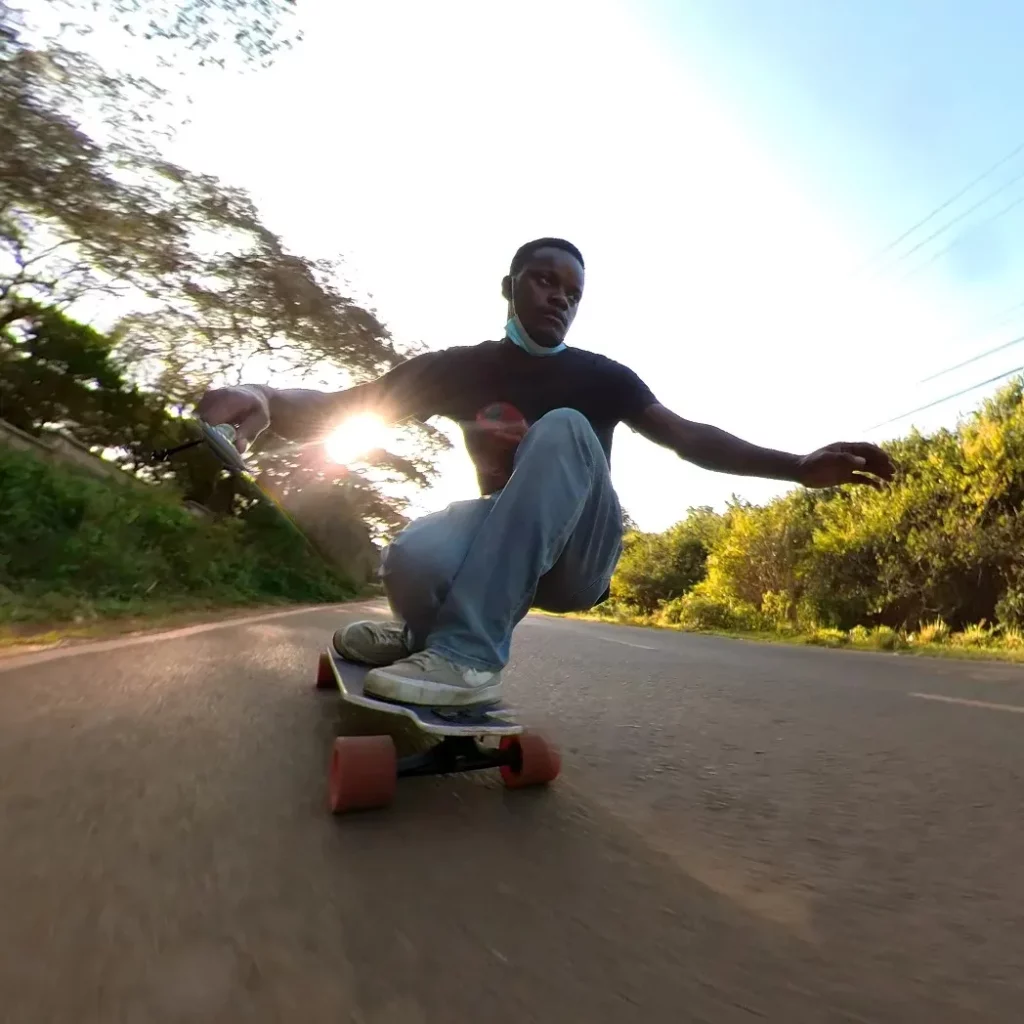
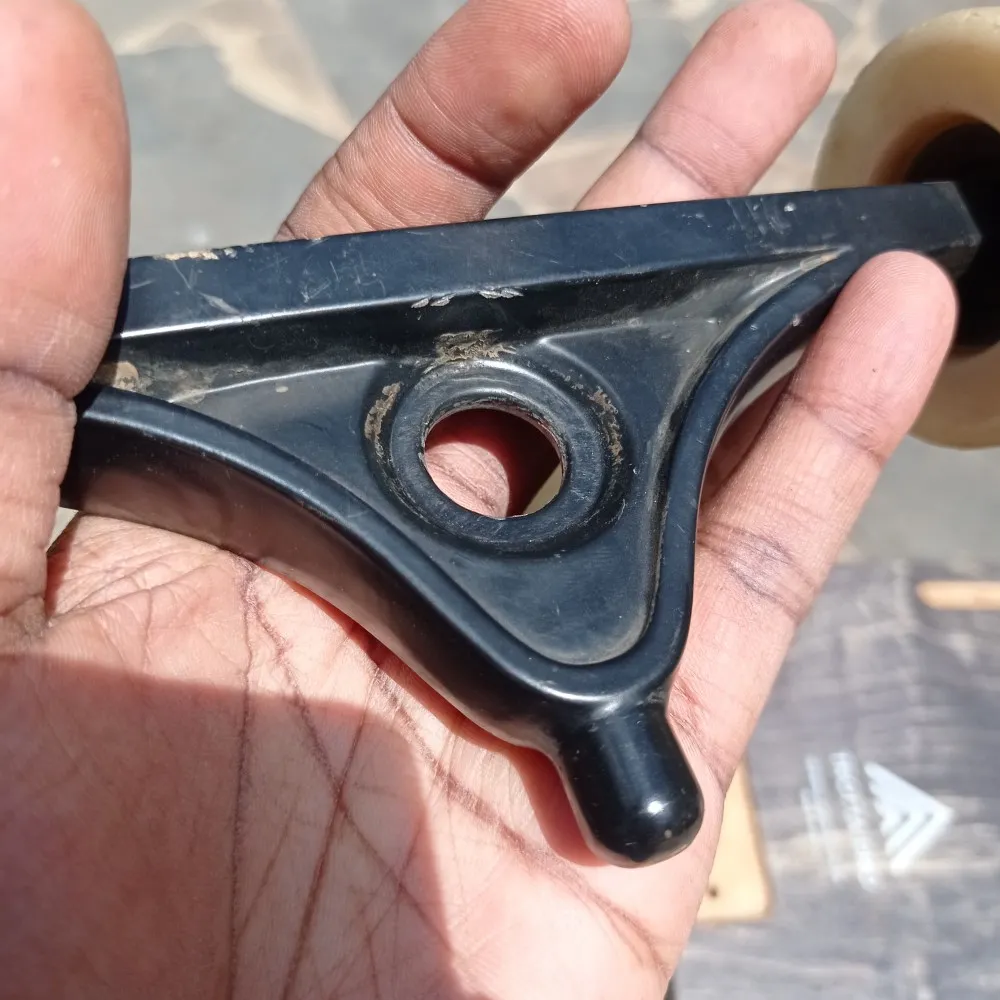
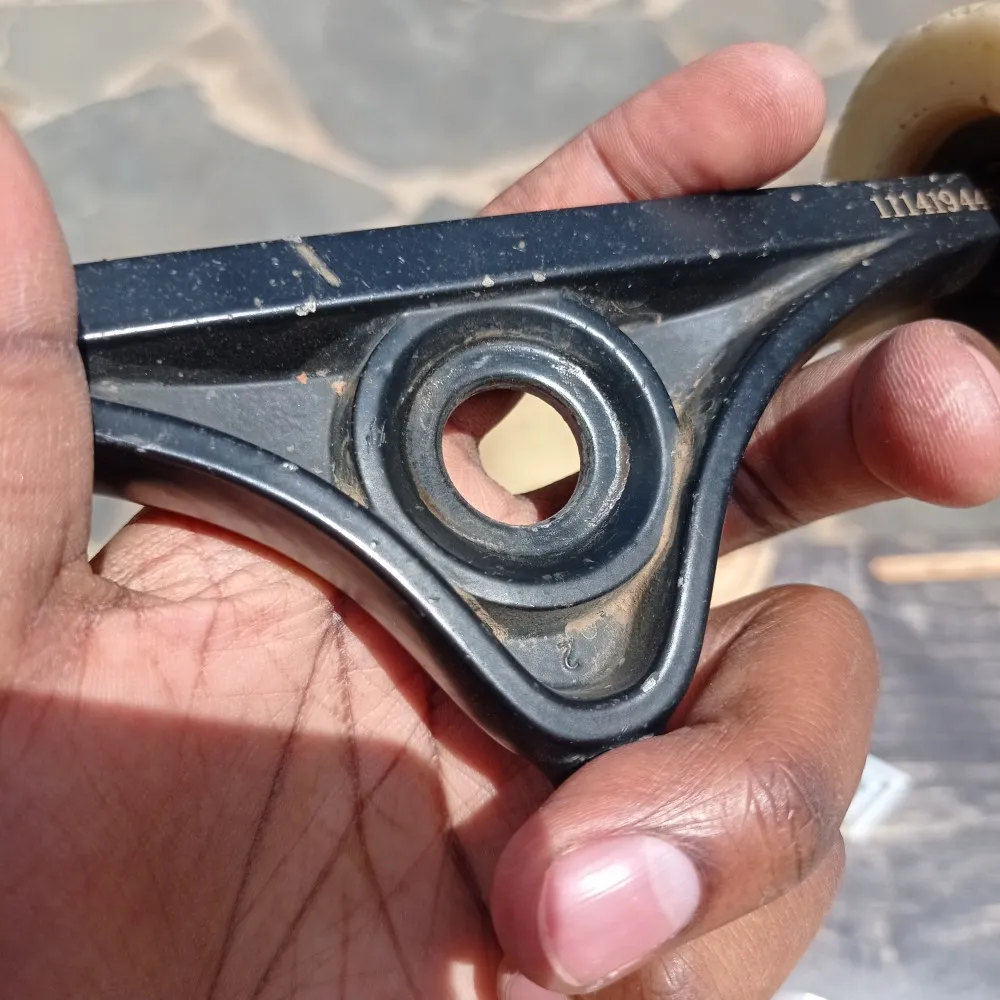
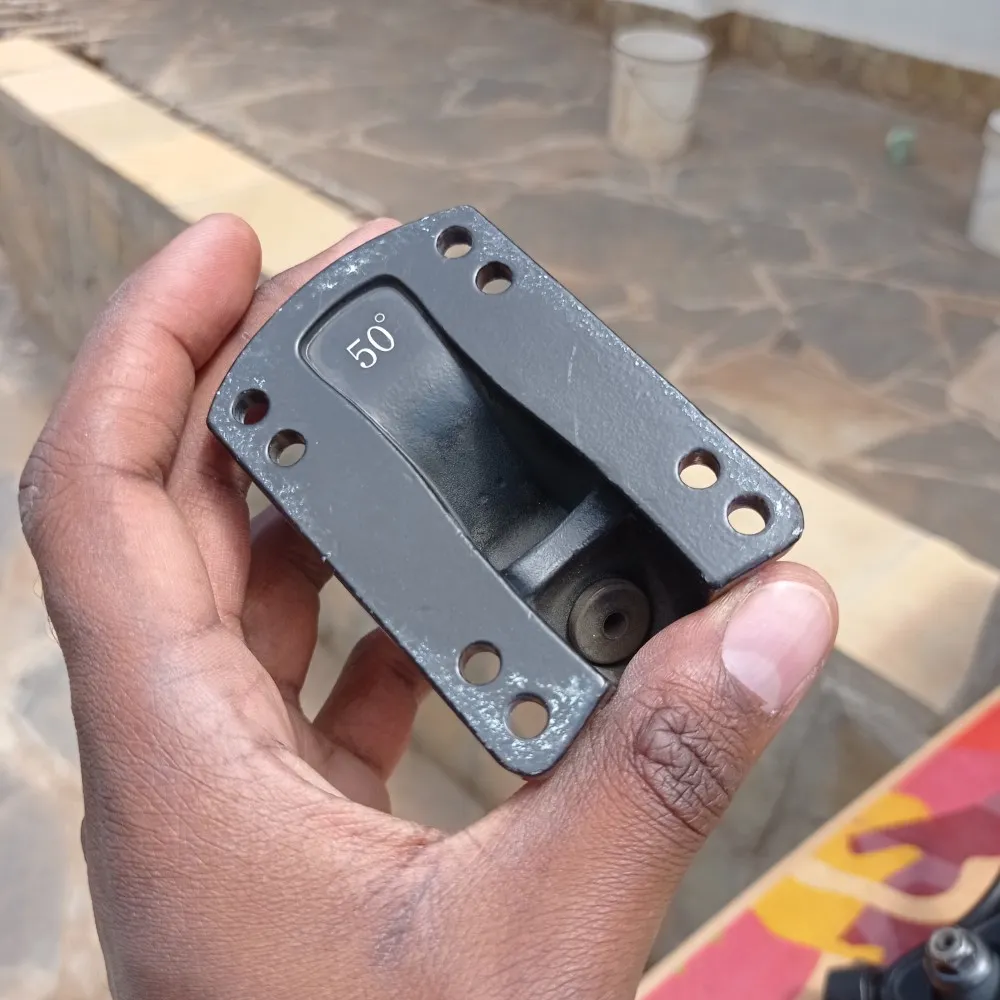
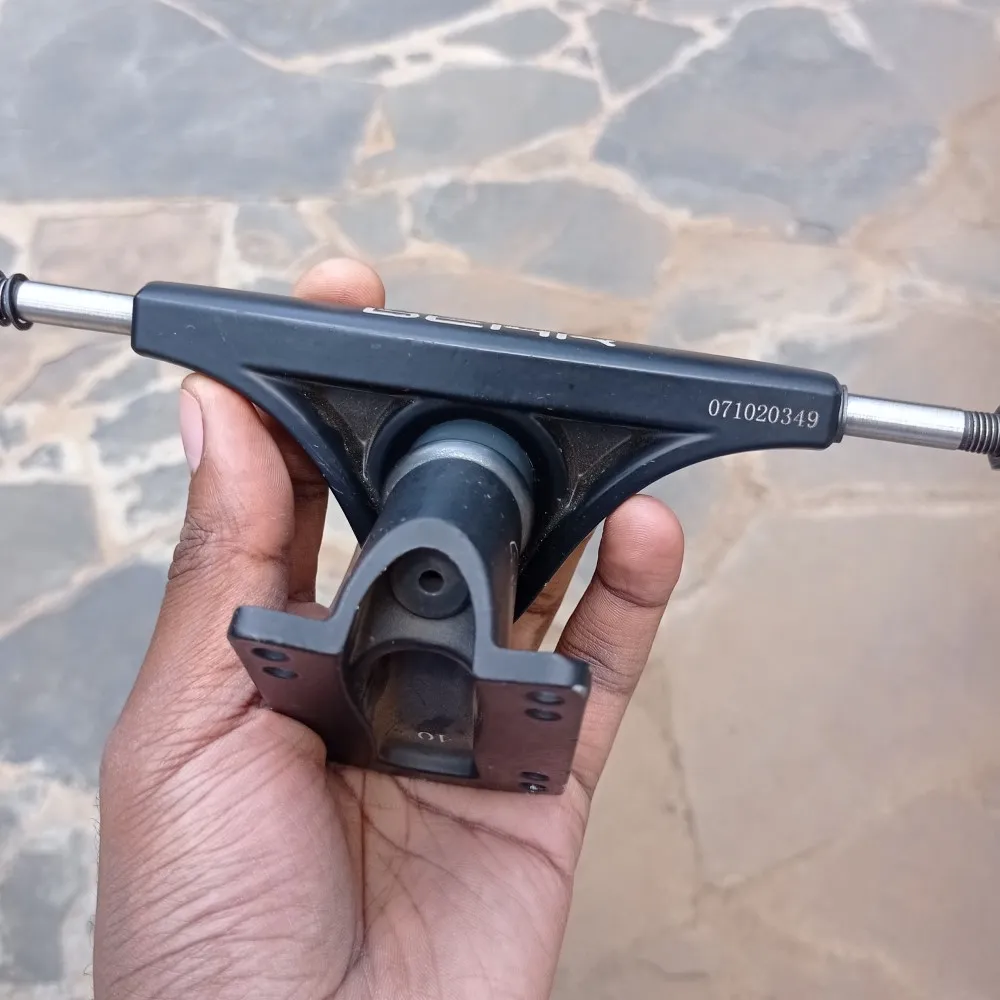
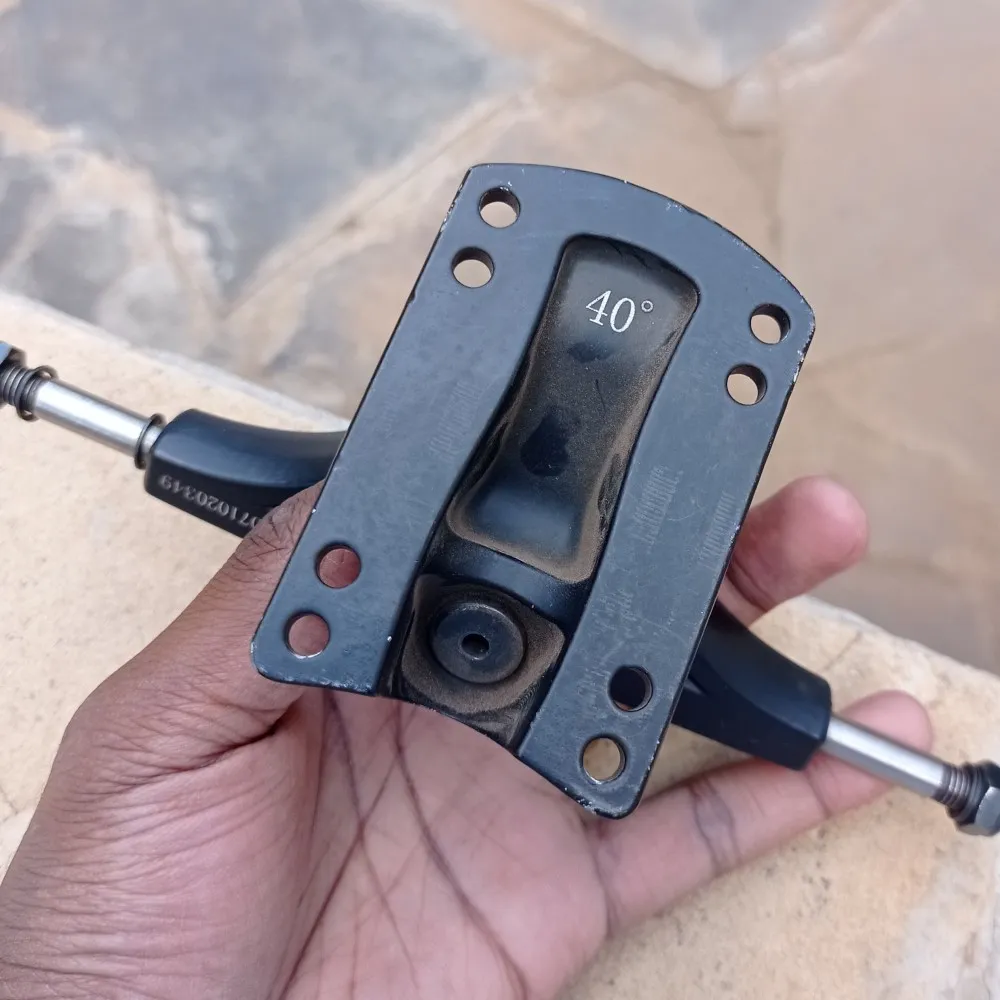
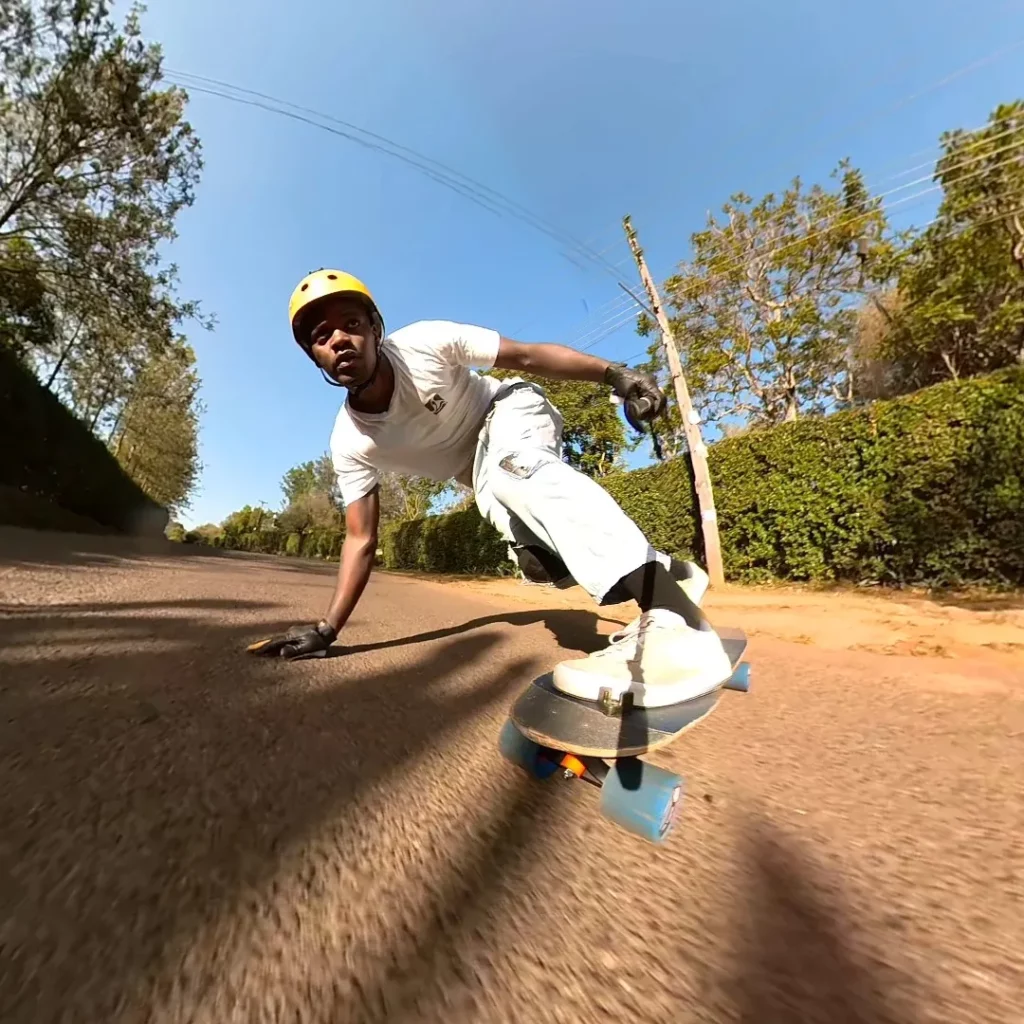
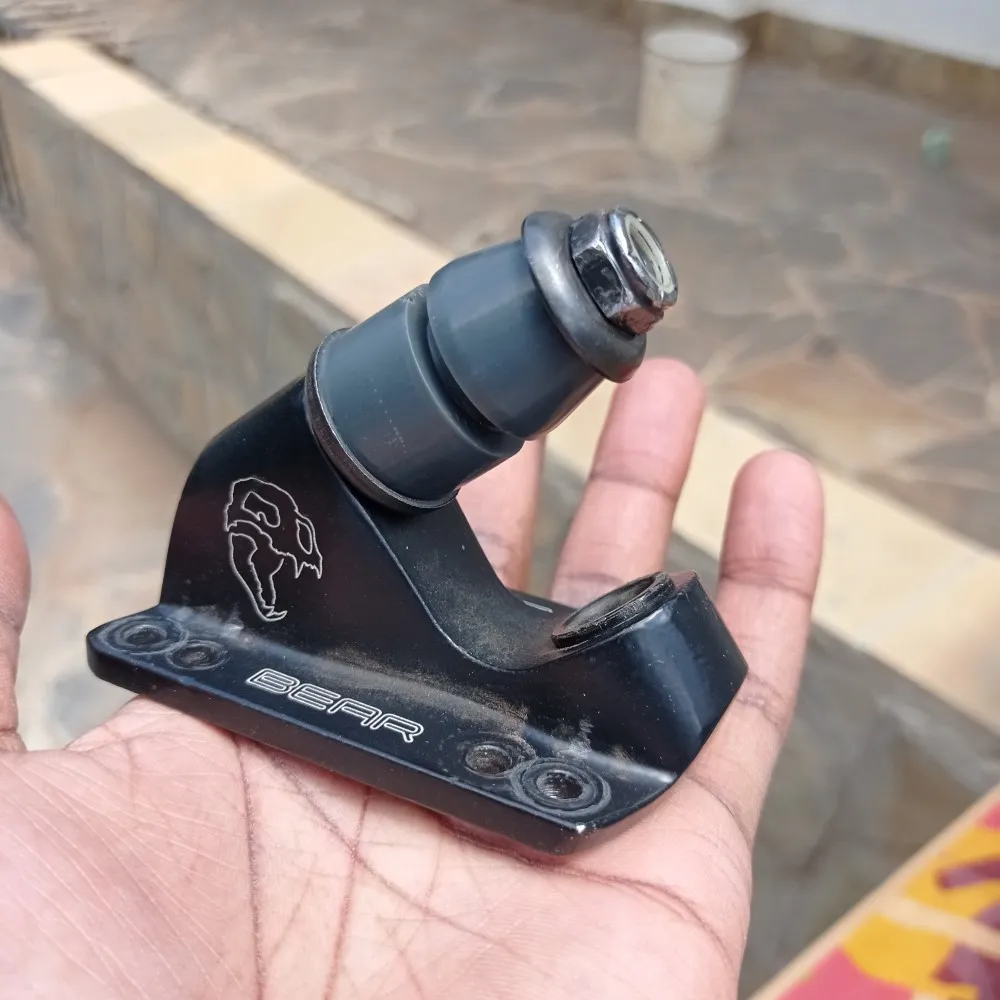
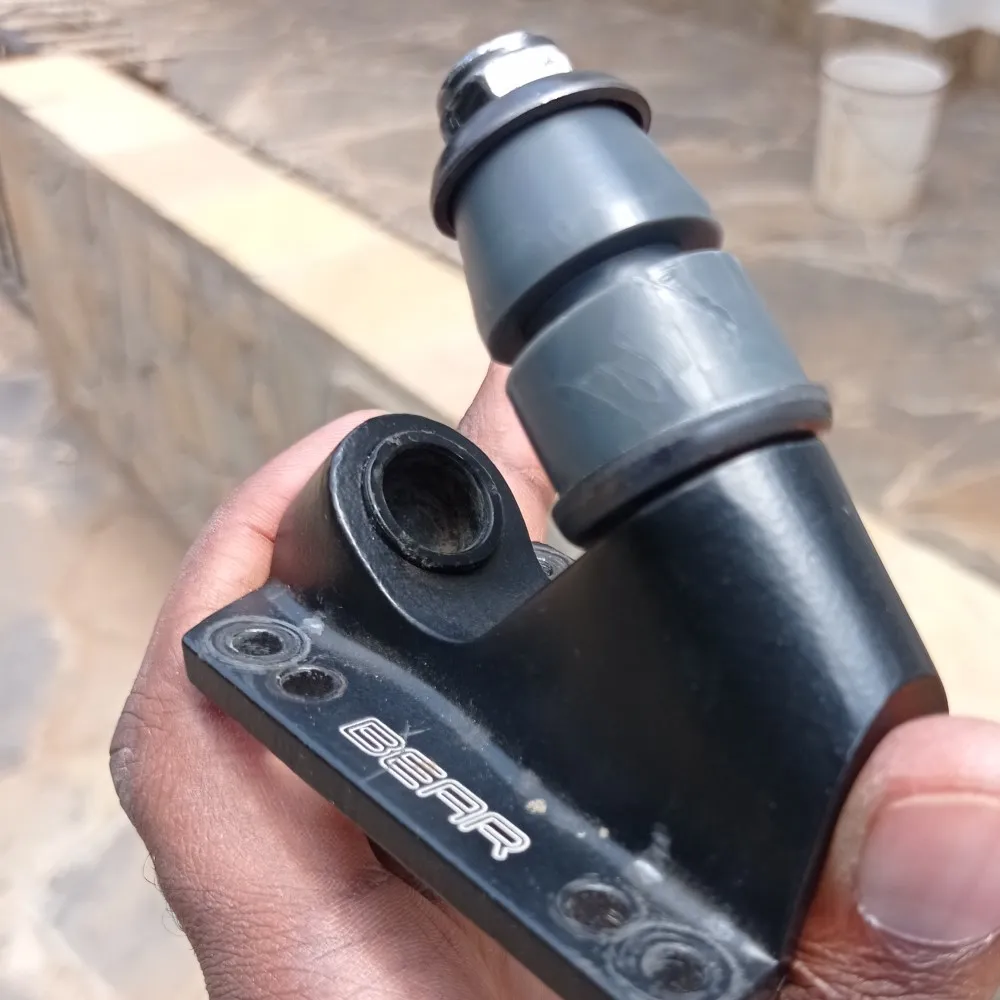
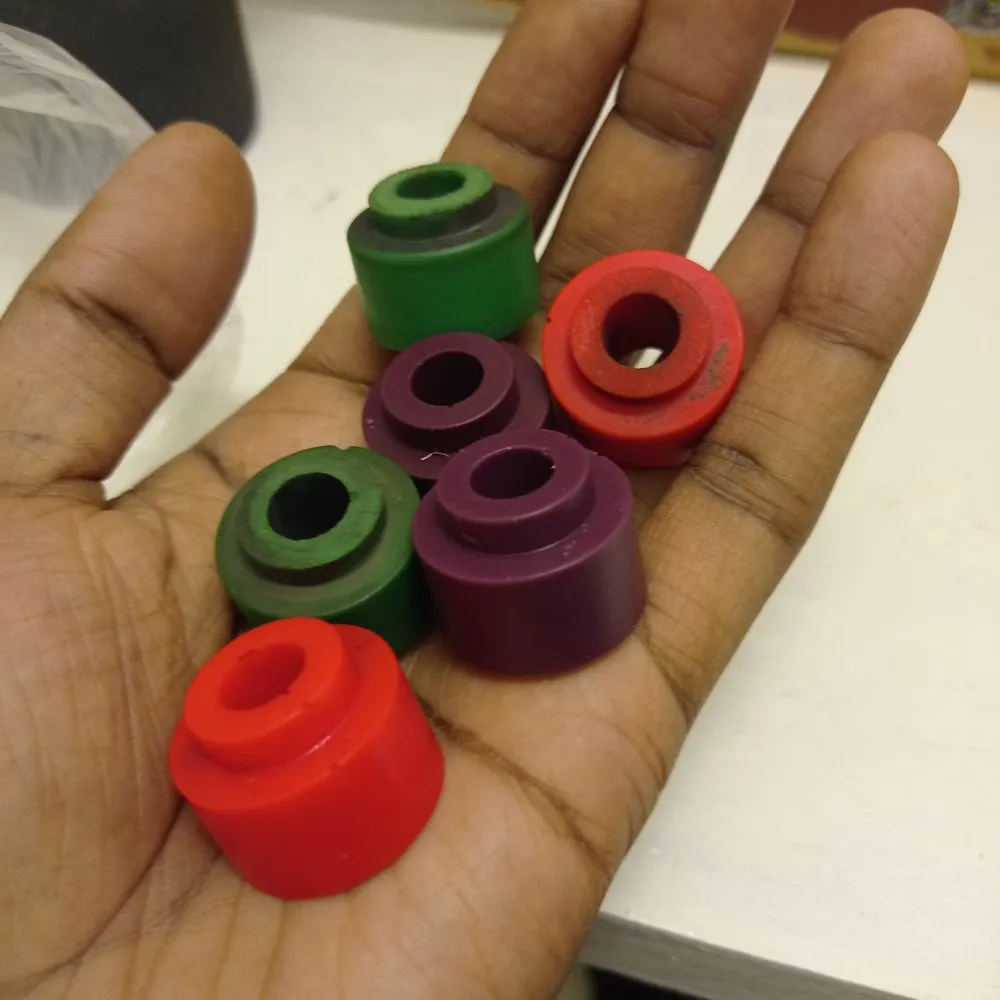
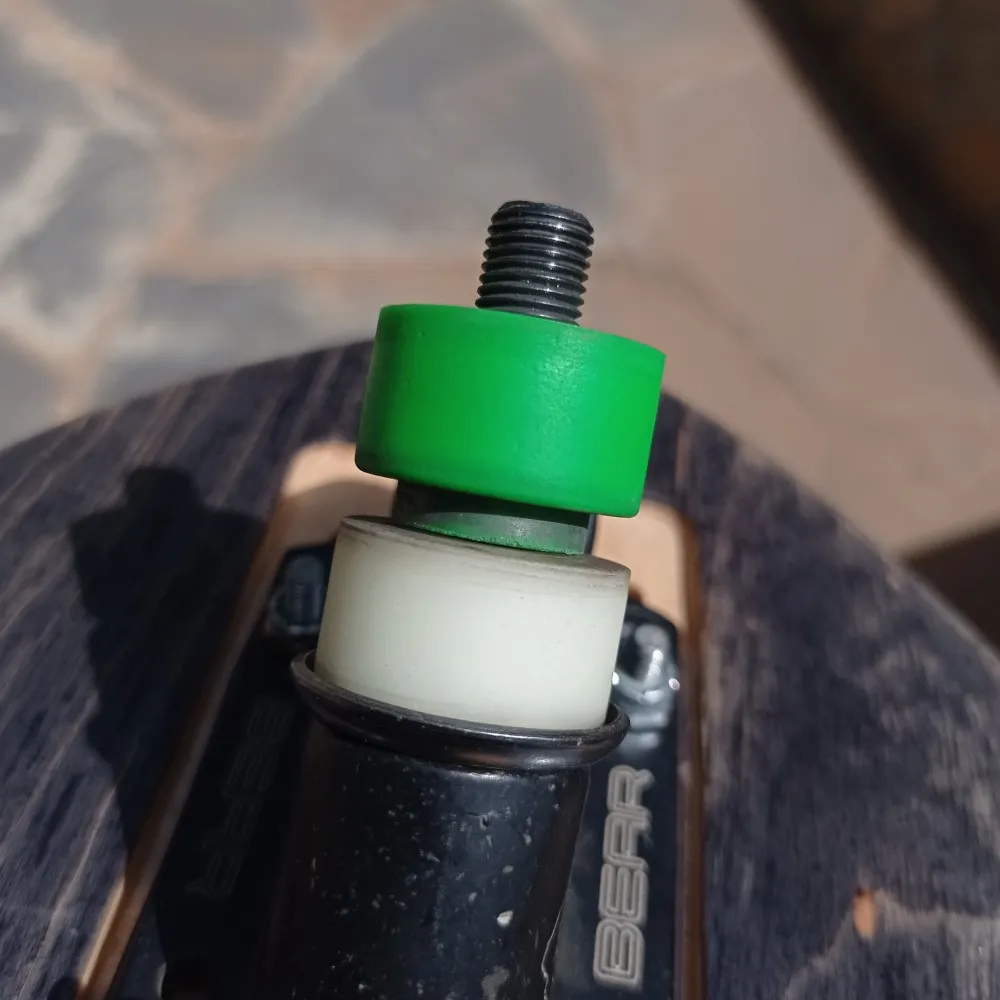
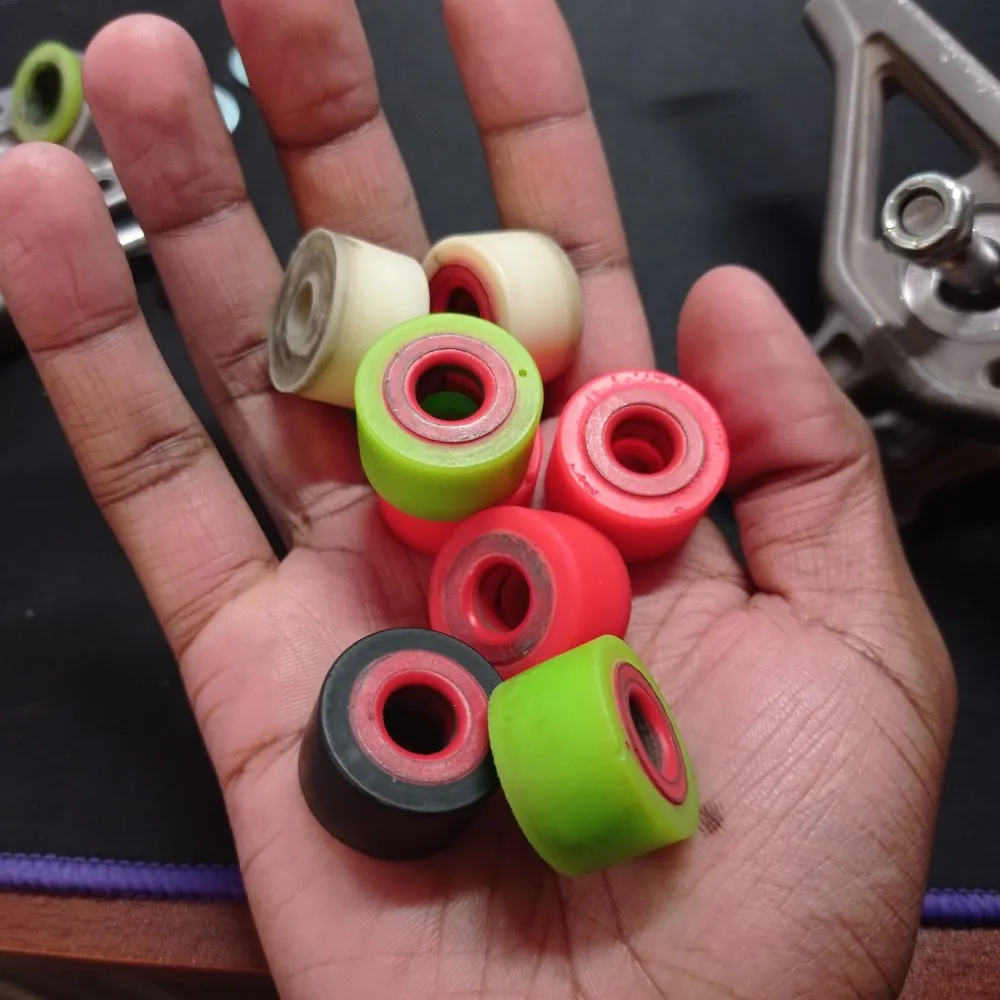
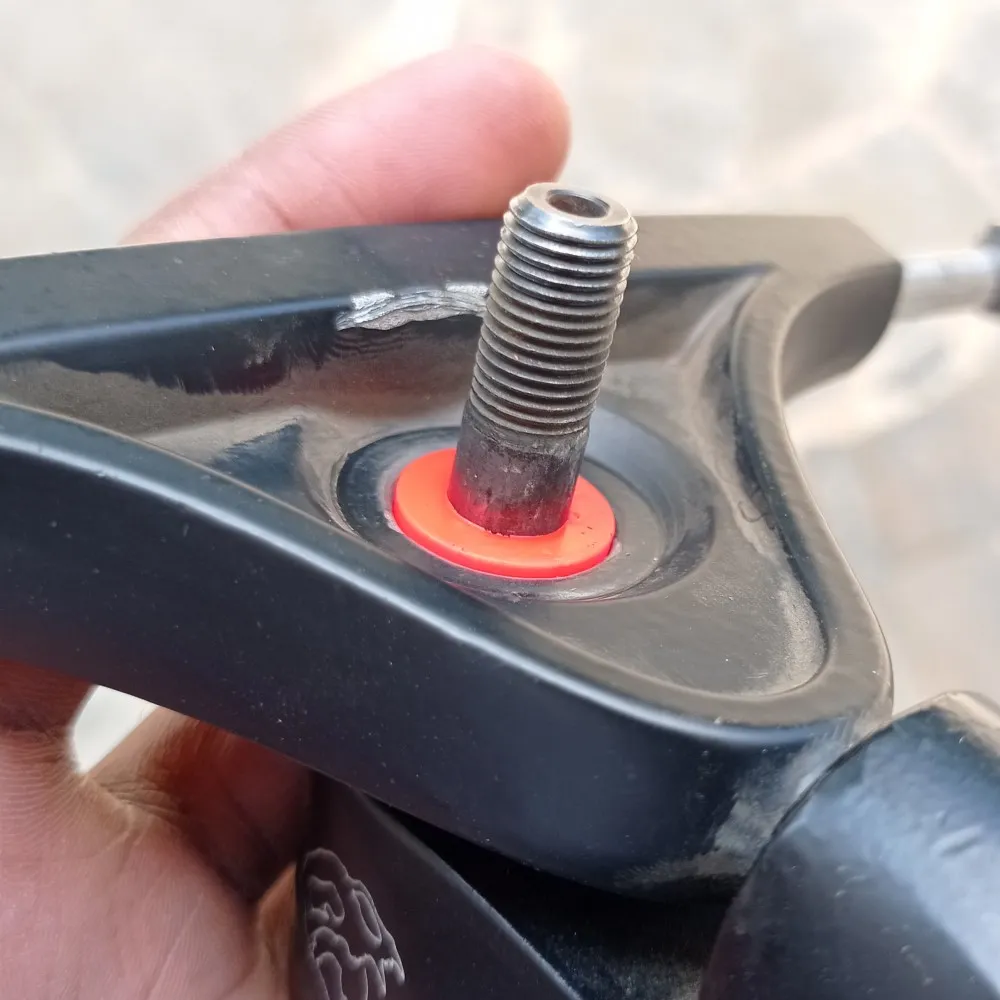
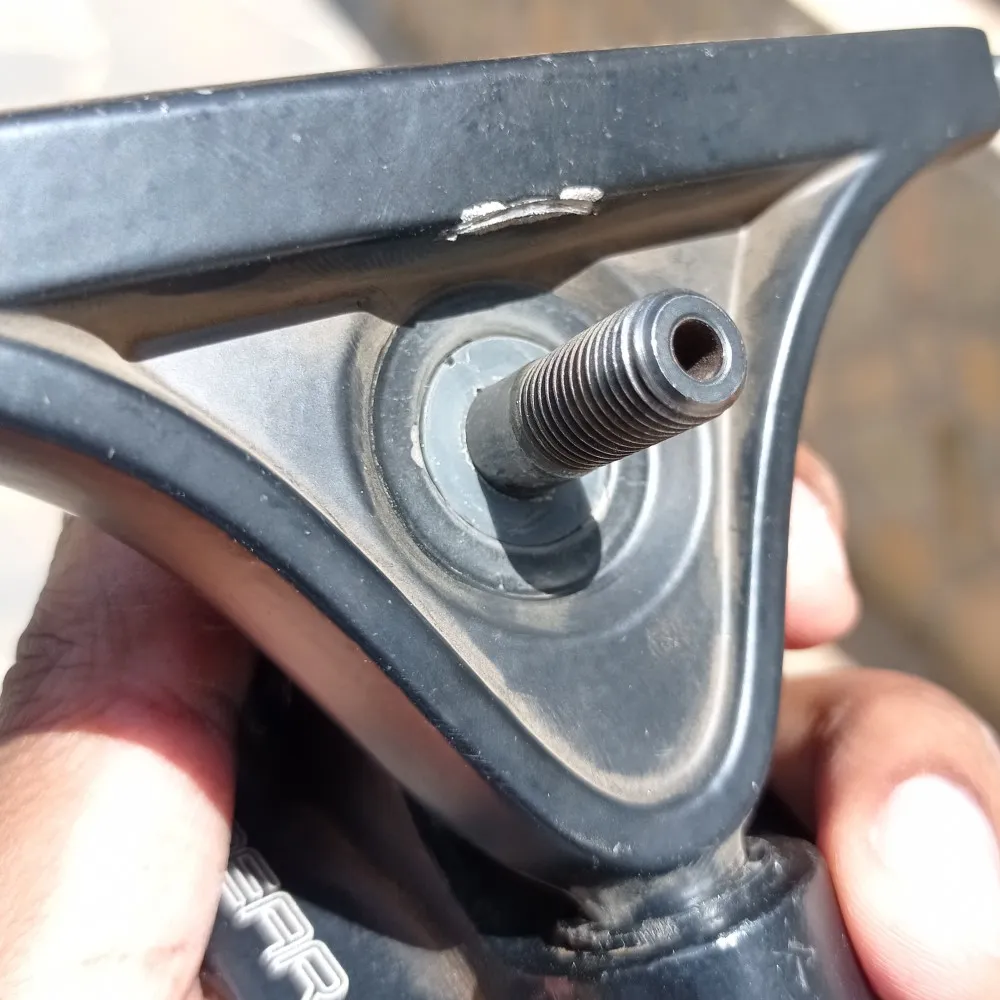
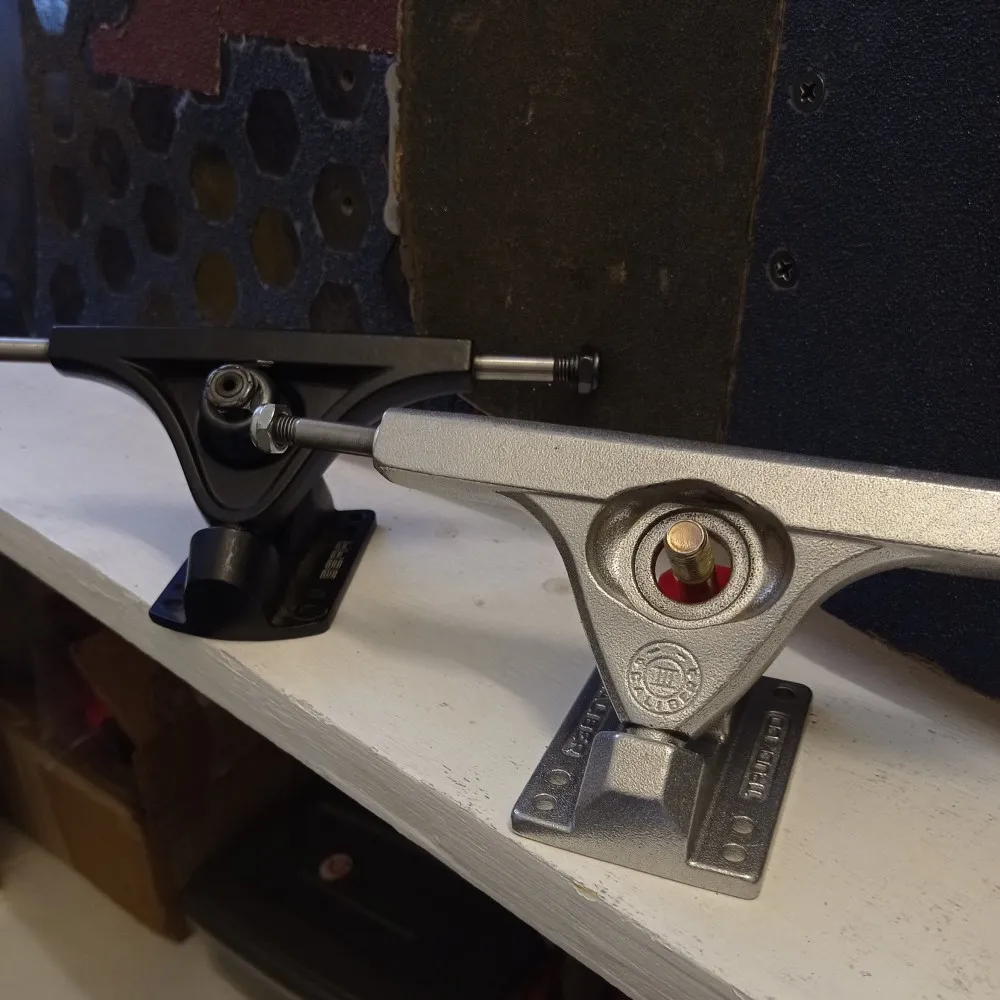
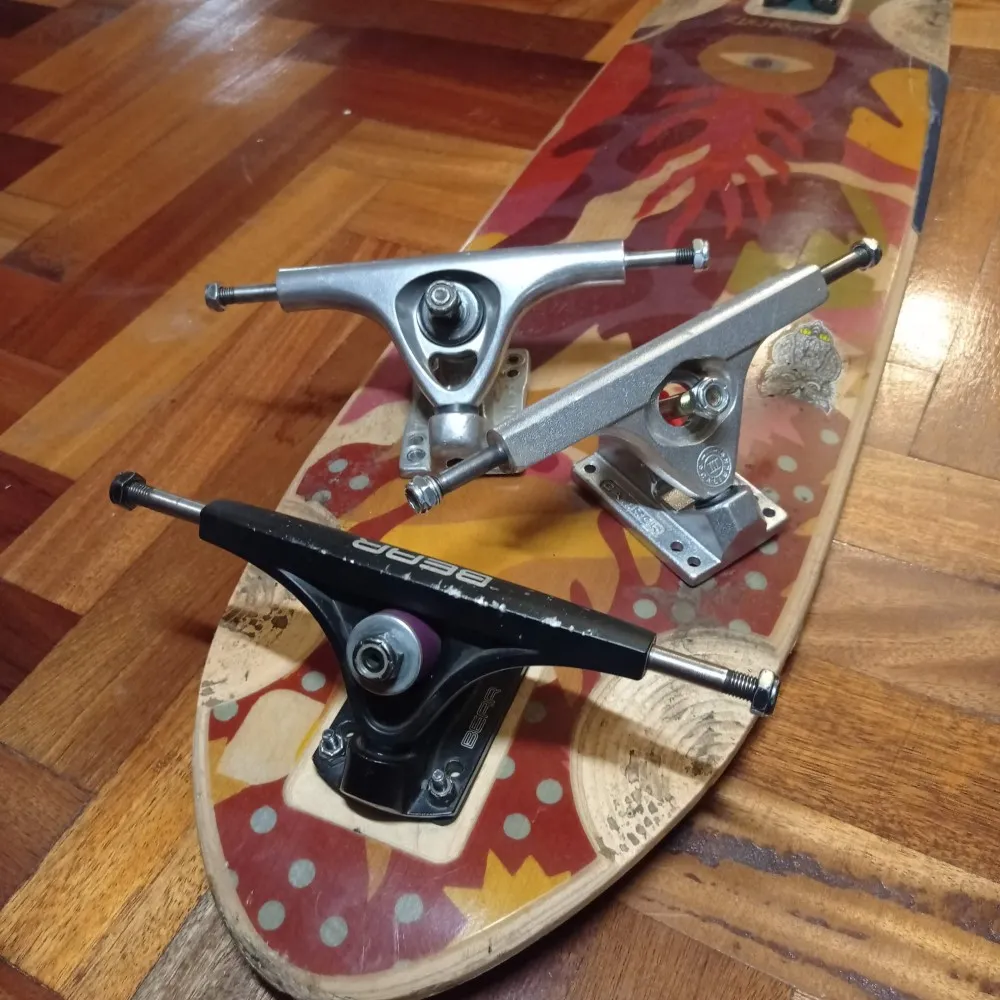
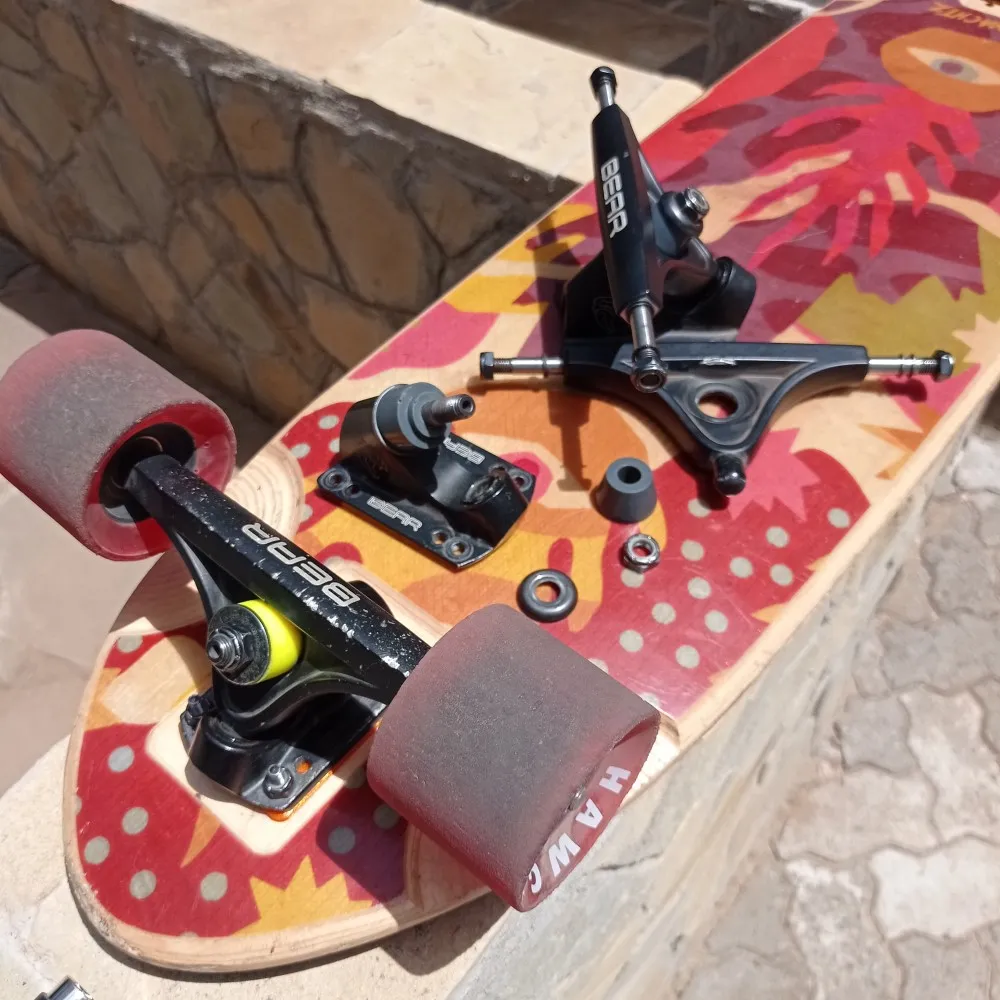
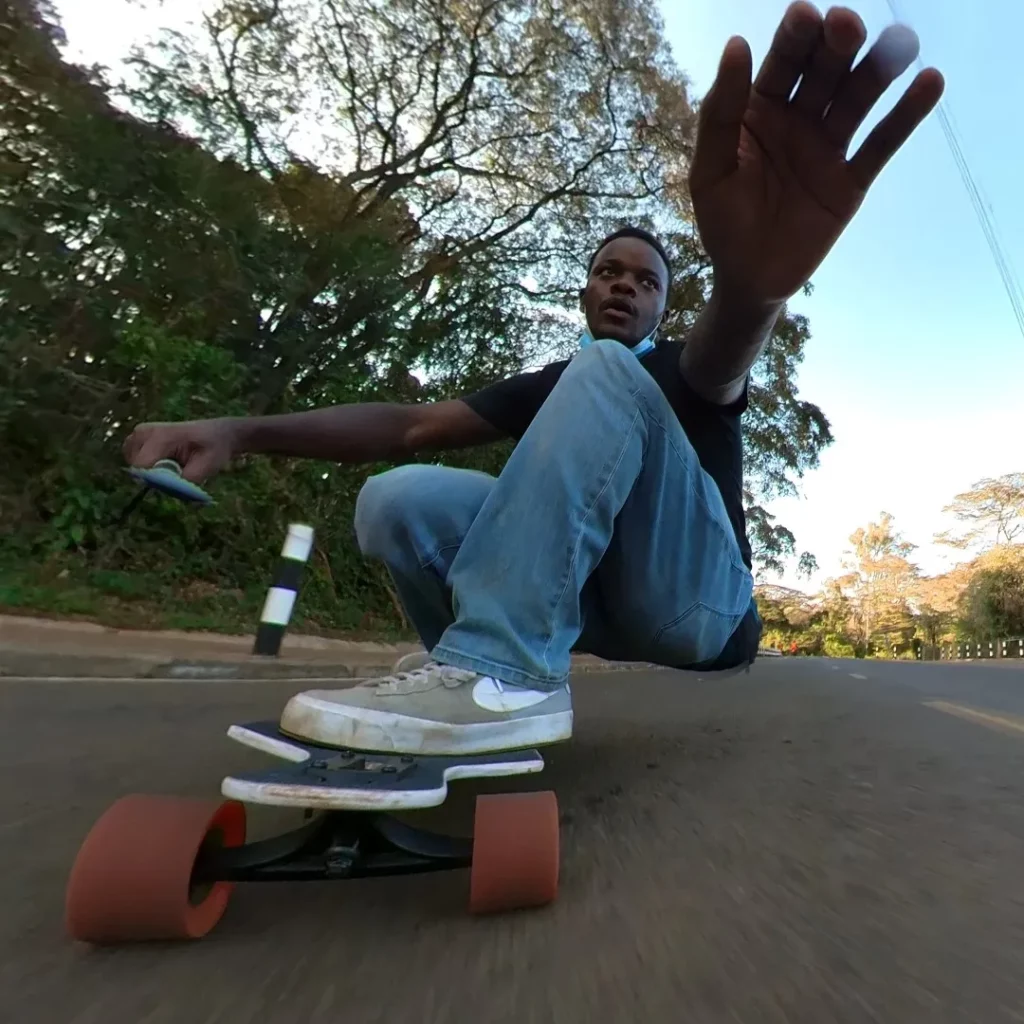

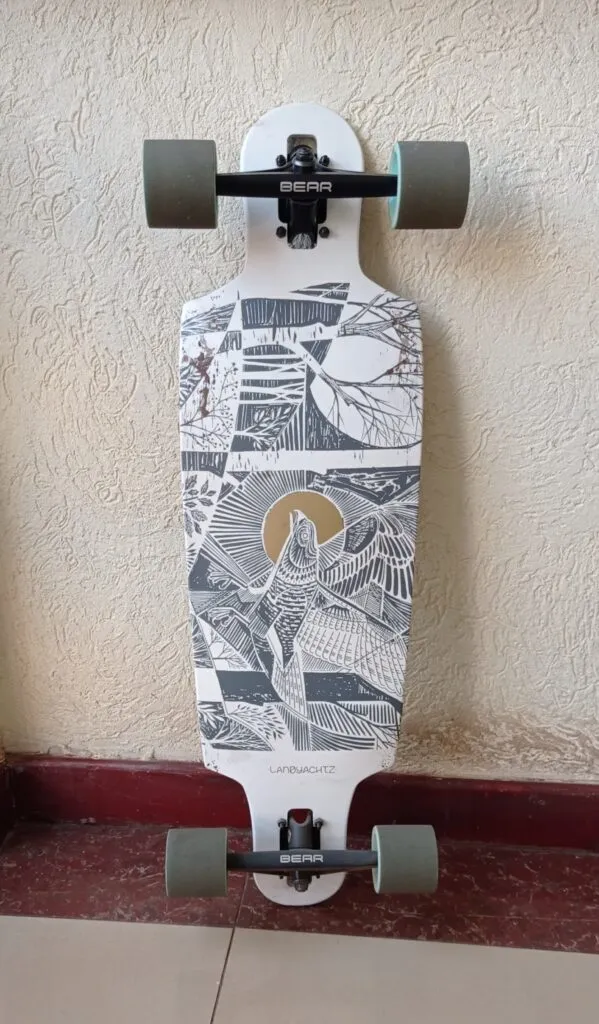
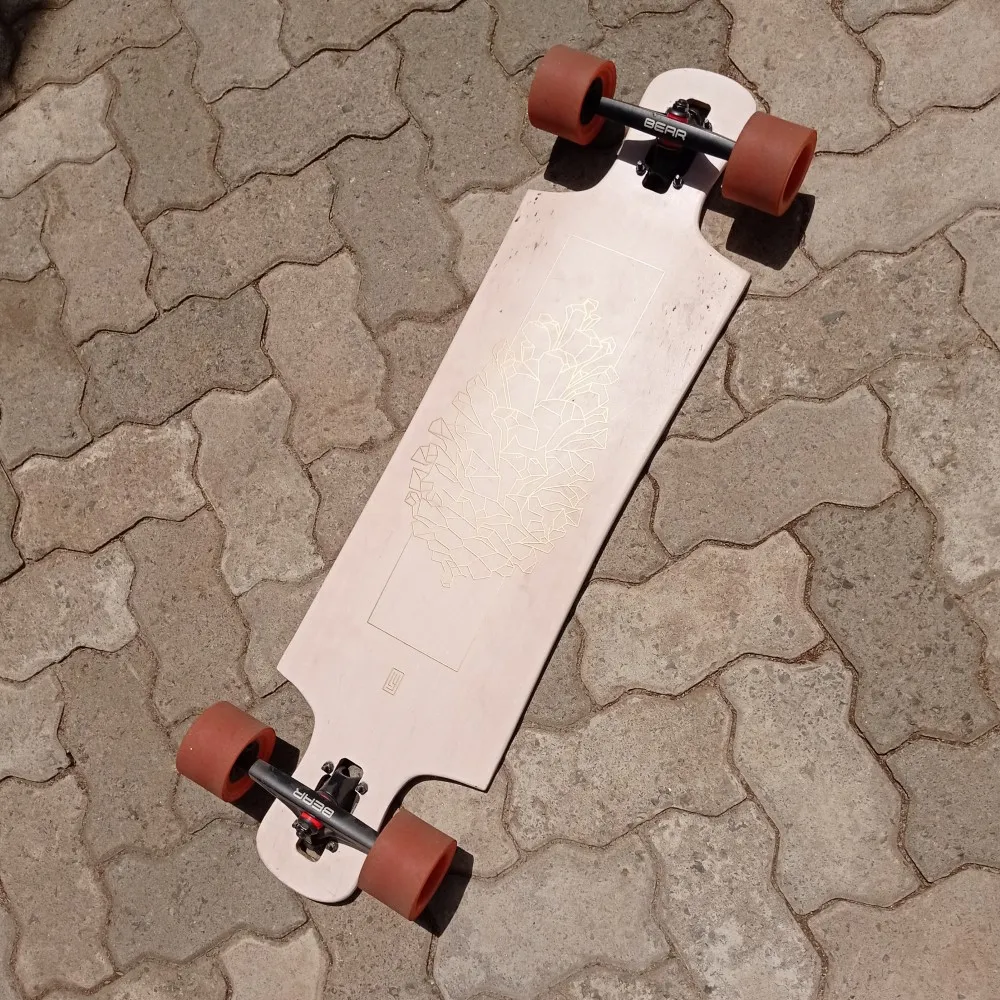
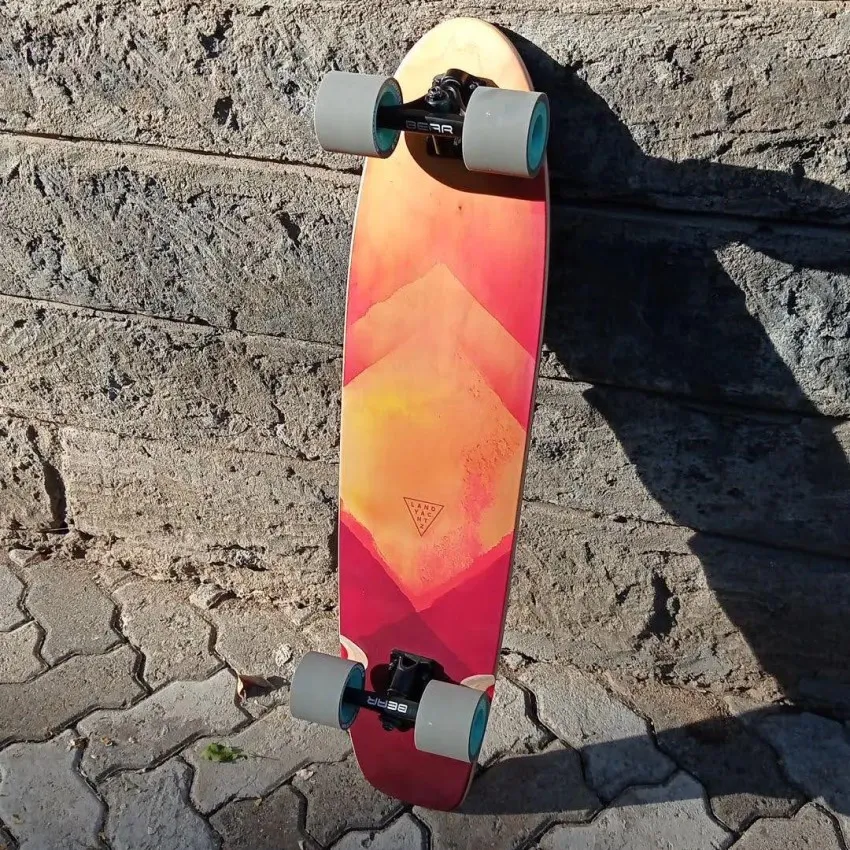
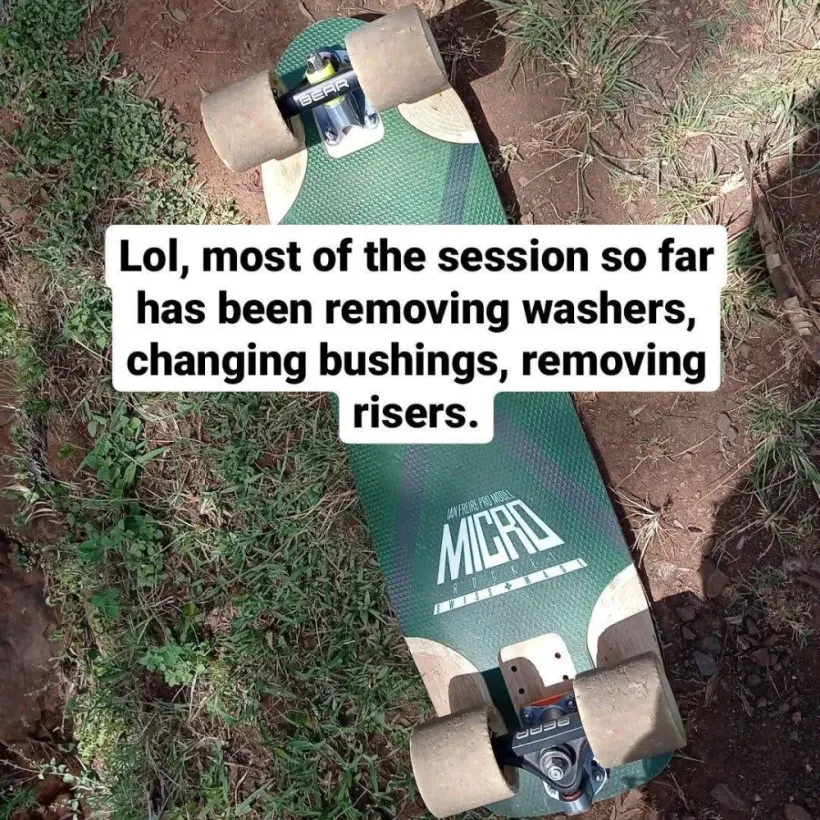
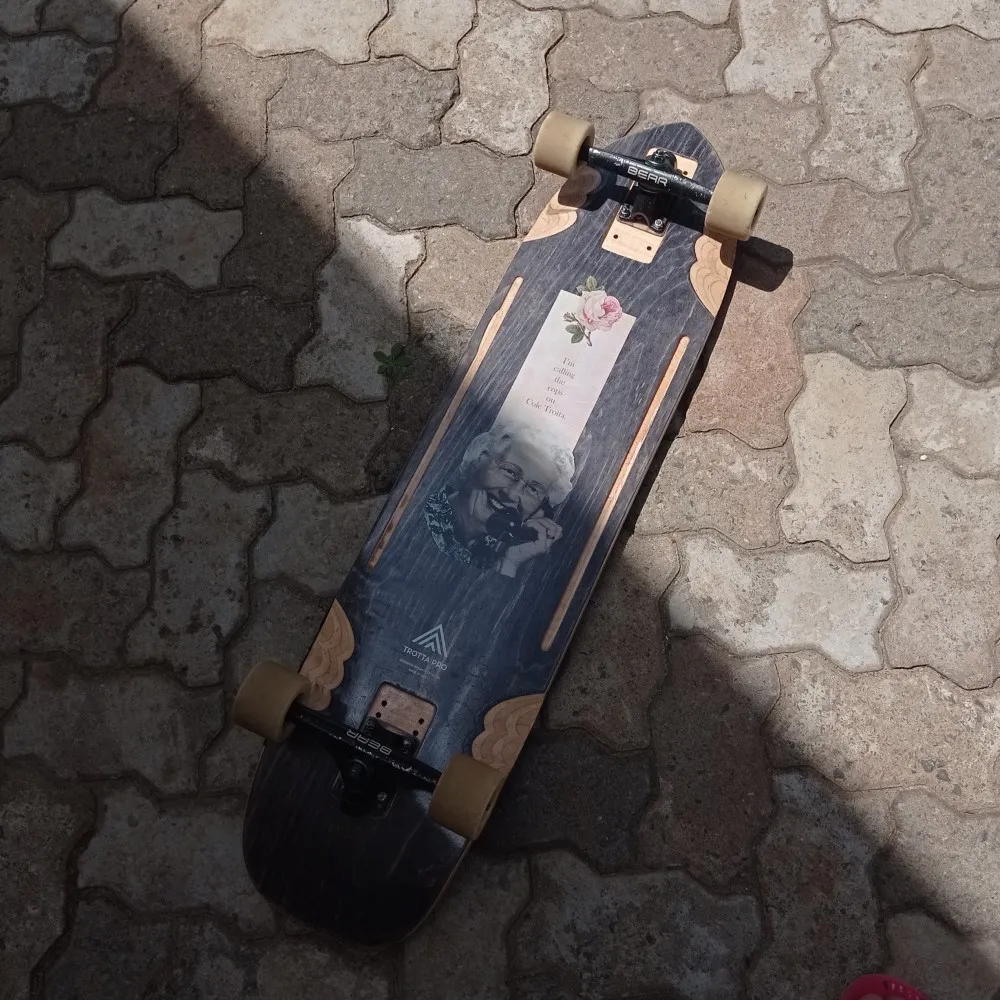
6 comments on “Bear Gen 6 Trucks Review”
Julien
March 11, 2022 at 10:00 pmHey Abuga,
Great content you’re putting out there. Can you let us know if the different baseplate angles are height matched?
Thanks!
AbugaA
March 14, 2022 at 4:33 pmHey!
Yes, the baseplates are height matched 🙂
Coral
April 9, 2025 at 7:04 pmHi Abuga,
how did you like the Gen 6 on the Micro? I am considering getting this combination as a mild downhill setup.
Thanks!
Coral
AbugaA
April 10, 2025 at 4:15 pmHey man, not really. I didn’t like the 130mm on any dh setup. Would only put them on a cruiser setup
Devon
May 27, 2025 at 2:43 amHello Abuga, I know you said for heavier riders to ride a plug on roadside but since you said it might not feel right would it better to run a softer plug board side and the 97a barrel roadside? Thanks a ton.
AbugaA
August 16, 2025 at 10:57 amHey man, no, just run the plug roadside. Or you can buy aftermarket insert from Pats risers which should work similarly well